- News
- Reviews
- Bikes
- Components
- Bar tape & grips
- Bottom brackets
- Brake & gear cables
- Brake & STI levers
- Brake pads & spares
- Brakes
- Cassettes & freewheels
- Chains
- Chainsets & chainrings
- Derailleurs - front
- Derailleurs - rear
- Forks
- Gear levers & shifters
- Groupsets
- Handlebars & extensions
- Headsets
- Hubs
- Inner tubes
- Pedals
- Quick releases & skewers
- Saddles
- Seatposts
- Stems
- Wheels
- Tyres
- Tubeless valves
- Accessories
- Accessories - misc
- Computer mounts
- Bags
- Bar ends
- Bike bags & cases
- Bottle cages
- Bottles
- Cameras
- Car racks
- Child seats
- Computers
- Glasses
- GPS units
- Helmets
- Lights - front
- Lights - rear
- Lights - sets
- Locks
- Mirrors
- Mudguards
- Racks
- Pumps & CO2 inflators
- Puncture kits
- Reflectives
- Smart watches
- Stands and racks
- Trailers
- Clothing
- Health, fitness and nutrition
- Tools and workshop
- Miscellaneous
- Buyers Guides
- Features
- Forum
- Recommends
- Podcast
news
“Insanely reductive framing of an entire continent”: Cycling fans react to Biniam Girmay being asked about not having money growing up; TfL bus driver claims cyclists should only use bike lanes; Tour de France pros do keepie uppies + more on the live blog
SUMMARY
No Live Blog item found.
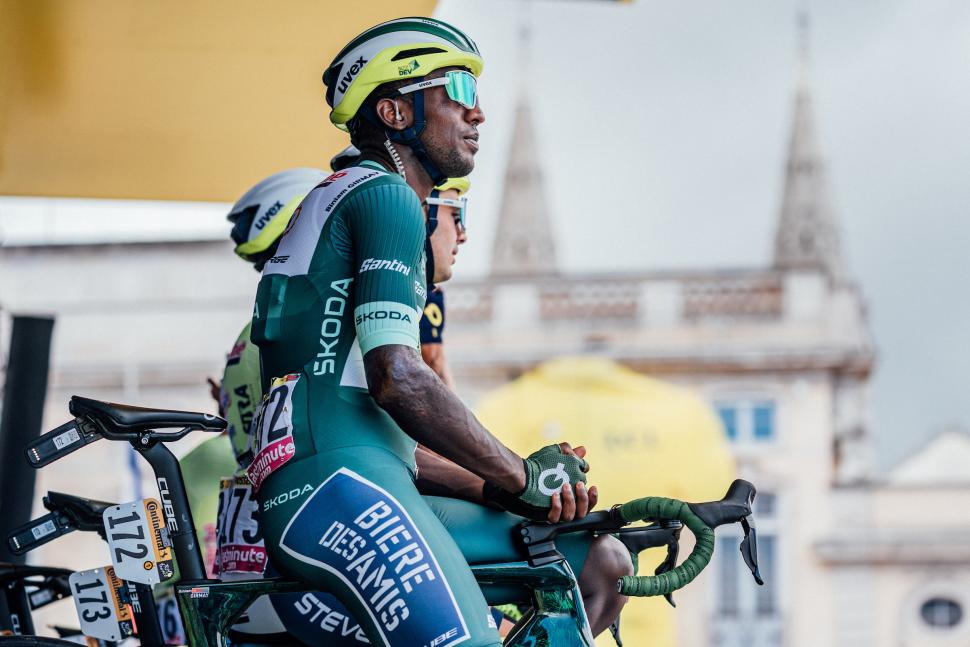 Picture by Zac Williams:SWpix.com - 04:07:2024 - Cycling - 2024 Tour de France - Stage 6 Macon to Dijon - France - Biniam Girmay, Intermarche Wanty
Picture by Zac Williams:SWpix.com - 04:07:2024 - Cycling - 2024 Tour de France - Stage 6 Macon to Dijon - France - Biniam Girmay, Intermarche Wanty17 July 2024, 08:22
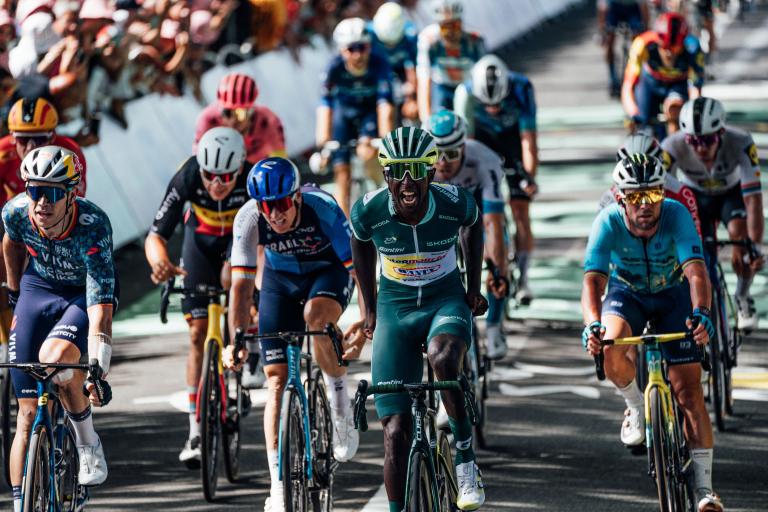
“An insanely reductive framing of an entire continent”: Fans react to Biniam Girmay being asked about not having money growing up, to which he replies: “Cycling is my passion, I don’t do it to get money”
In a Tour which has had everything so far, from the engrossing general classification battle of Tadej Pogačar and Jonas Vingegaard, Mark Cavendish winning his 35th stage, Romain Bardet in yellow in his last rodeo, Remco Evenepoel winning a time trial on his debut… I can keep going on.
But one of the best, if not the best, storyline to come out of this race has been the success of Biniam Girmay, the Intermarché-Wanty rider from Eritrea who was initially drafted in the team to support sprinter Gerben Thijssen, but has instead made the show all about him, not only becoming the first black African rider to win a Tour de France stage, but going on to win two more and grab the green jersey.
Despite his crash in the final two kilometres yesterday, Biniam still has a 32-point lead over last year’s green jersey winner Jasper Philipsen, and with all sprint stages, this battle looks set to go down to the wire.
Meanwhile, back in Asmara, Eritrea’s capital, people have taken to the streets to celebrate their home hero, with cycling going higher and higher in popularity in the country
Watch the moment the streets of Asmara in Eritrea erupt as local hero, cyclist Biniam Girmay, won his third stage of this year's Tour de France! 🇪🇷
🚴 Tour de France | Watch on SBS or stream free SBS On Demand here: https://t.co/qNexrLIZQy pic.twitter.com/tE4faqpTFh
— SBS Australia (@SBS) July 15, 2024
However, with Biniam still the only black cyclist in the pro peloton, fans have criticised a French documentary about the 24-year-old where the interviewer asks him a strange question, but his response is even more graceful and commendable.
“Maybe it’s a strange question, but how was your childhood?” the interviewer asks in the documentary titled C’est mon tour (‘It’s my turn’). “Did you have trouble with money? Was cycling a way to get out of…”
Biniam replies: “No, this question is bad. My family is not rich, not poor. They are alright, they have everything. Cycling is my passion, I don’t do it to get money or rich.”
That sucks. I'm glad he stood up for himself
— The Cycling Dad (@JayDadCycling) July 17, 2024
Fans have criticised this question from the documentary which aired in April this year, with a Twitter account writing: “Such an insanely reductive framing of an entire continent as large as Africa, it's unreal.”
Other people pointed out the subtle racism, saying that the same question doesn’t get asked to former pro from South Africa Daryl Impey who wore the yellow jersey in 2013, or Biniam’s teammate South African teammate Louis Meintjes, or even four-time Tour winner Chris Froome, who grew up in Kenya.
Such an insanely reductive framing of an entire continent as large as Africa, it's unreal
— #SiempreGino (@NairoInGreen) July 17, 2024
However, some people also noted the reportedly poor economic conditions of Eritrea, most notably caused by global sanctions imposed by the west due to the country’s Marxist-Lenninist government which rose to power after the Eritrean War of Independence.
What do you think? Was the question justified or is this yet another case of deep-rooted racism?
17 July 2024, 16:31
Near Miss of the Day 912: Police forward case for prosecution after driver's "ridiculously close pass" on cyclist
17 July 2024, 16:26
Two very contrasting reactions to King's Speech from CyclingUK and Collaborative Mobility UK
Following the official opening of this Parliament with the King’s Speech, Cycling UK has given its response to the proposed bills and measures which will have a direct impact on cycling.
Sarah McMonagle, director of external affairs at Cycling UK, said: “In today’s King’s Speech the government has presented a promising plan for the future of transport in this country. Commitments made to get Britain building have the power to enhance economic growth, improve public health, and help us meet our climate targets. However, this progress is contingent on ensuring that investments include the development of walking and cycling infrastructure from the get-go.
“We are encouraged by the prospect of increased local decision-making and see it as an opportunity to grant local leaders in England more authority to implement transport improvements in their communities. We will push the Government to pair this with increased investment in active travel, to ensure the huge benefits of cycling, for our health, our economy and our environment, are realised.”
However, the reaction from Collaborative Mobility UK was quite contrasting, the charity saying that it was it is “disappointing” to see that the King’s Speech failed to legalise e-scooters or expand car clubs and bike share schemes.
Richard Dilks, chief executive of CoMoUK, said: “It is disappointing that after its comprehensive victory at the election earlier this month, Labour has not seized the chance to be as bold as it could have been in the King’s Speech.
“We welcome the government’s intention to improve services for bus and rail passengers, but there is a clear policy gap when it comes to shared transport, which has the potential to work alongside these other reforms in decarbonising the way we travel.
“Giving e-scooters and other similar vehicles legal status is a common sense move that would bring the UK into line with most other European countries and give people a flexible and green way to get around.
“In the meantime, we would like England’s e-scooter trials to be expanded, with more vehicles covering wider areas in response to local demand. New schemes should also be approved in council areas that could benefit.
“Today’s announcement of plans to give more powers to local councils in England should also include the ability to expand the use of shared transport, whether that is through new bike schemes or on-demand buses following flexible routes.
“Any shake-up to the planning system should also ensure that bike share schemes, car clubs and other similar initiatives are put front and centre.
“Ministers have a huge opportunity to push ahead with the expansion of shared transport, which our research has shown carries numerous benefits, including cutting greenhouse gas emissions and improving people’s health. They need to seize the day.”
17 July 2024, 15:49
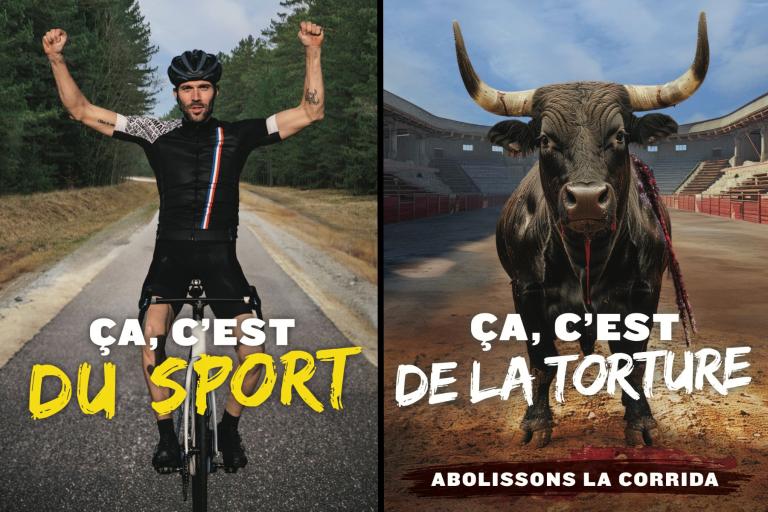
Say Pi-NO to bullfighting: Thibaut Pinot launches campaign with PETA to bring an end to bullfighting
At the finish line of yesterday's stage 16 at Nîmes, photos of former pro (and everyone's favourite rider) Thibaut Pinot raising his arms in the air, with the caption “This Is Sport,” with that of a bull – whose horns echo the position of the cyclist’s arms – in an arena during a bullfight with the message “This Is Torture” to remind everyone that unlike the impressive Tour de France, bullfighting has nothing to do with sportsmanship or valour.
“Bullfighting is anything but sport. It’s a macabre spectacle of the torture and killing of a terrified animal,” says PETA Vice President for Europe, the UK, and Australia Mimi Bekhechi. “Thibaut Pinot’s campaign for PETA France highlights the difference between an impressive display of endurance and ritualised slaughter and reminds people around the world that bullfighting has no place in modern society.”
Pinot, a known lover of animals with a farm full of goats, donkeys and cows in Mélisey, has jumped on this campaign with PETA France to raise awareness for the charitable cause.
Meanwhile, PETA France has written to the organisers of the Tour de France asking that the tour not pass through towns or cities where bullfights still take place, so as not to turn a blind eye to these bloody practices from another age, which tarnish France’s image on the international stage. The group points out that 75 per cent of the French population wants these bloody spectacles banned.
17 July 2024, 14:44
Tadej Pogačar attacks on Col du Noyer, as Vingegaard tries to fight back with Laporte's assistance
Ain't no rest for the wicked seems to be the tune on Tadej Pogačar's mind as the yellow jersey attacks with just 5km to go!
Meanwhile, Jonas Vingeagard has tried to follow but only been able to catch teammate Christophe Laporte up the road, as the Visma-Lease a Bike pair along with Remco Evenepoel try and bridge the gap to Pogačar.
#TDF2024 - 🏁 4.7 KM
Attack Pogacar!!!!
Vingegaard is struggling as Evenepoel follows!#DomestiqueLive pic.twitter.com/sZSNyYLSp6
— Domestique (@Domestique___) July 17, 2024
Breakaway madness, a Richard Carapaz win on the table, AND a GC battle?!
17 July 2024, 14:18
The idiocy of spectators continues this Tour de France...🤦🏽♂️
Do watch where you're waving your flags 🤦♂️#TDF2024 pic.twitter.com/1woriGDfyj
— ITV Cycling (@itvcycling) July 17, 2024
17 July 2024, 14:04
What happens when a Tour de France rider punctures? From wheel and bike swaps to neutral support, here's how pros get back on the road in rapid time
The Tour de France is one of the most gruelling and prestigious cycling races in the world, and although race organisers do their best to make the riding conditions as good as they can get for the riders, punctures are still inevitable.
With riders covering around 3,500 kilometres across varied and challenging terrain, punctures happen, and often at the worst possible times. But unlike us, the pros don't carry a full puncture repair kit in their back pocket – instead, they mostly rely on their team support to get them back riding again. So how do the teams and riders deal with punctures, then? In this article, we delve into all the tips and tricks the pro teams use for getting riders back on the road again rapidly...
17 July 2024, 12:49

The capitalism fete goes on for one more day, check out some more sweet cycling deals on the road.cc Prime Day live blog
One more day, just one more day!
As long as we are forced to bow down to our capitalist overlords, might as well make some hay while we are it, and guide you to some very sweet deals that you may or may not need to improve your cycling experience on this second and final Amazon Prime Day. Psst... this is also us directing you to your local bike shop later on.
17 July 2024, 12:07
Islabikes launches spare parts website, as founder returns as "100%" owner "motivated by idea of keeping all Islabikes we sold over 18 years in circulation"
Islabikes may have ceased production of its well-respected children's bikes in the autumn, but founder Isla Rowntree has returned as "100 per cent owner" and has launched a new spare parts website to help keep "all the Islabikes we sold over 18 years in circulation".
The Islabikes website now displays a range of spare parts for purchase, with a handy selector tool to help customers filter the exact part they will need based on the model, size and age.
17 July 2024, 11:49
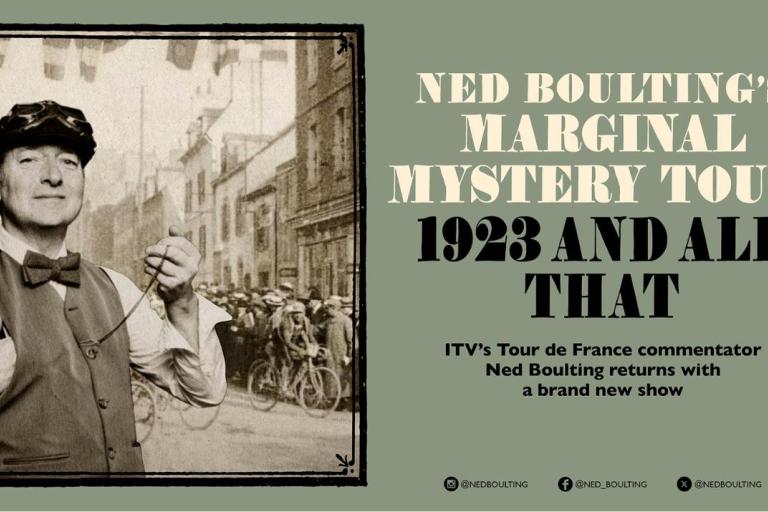
If you've been enjoying Ned Boulting's dulcet tones on ITV4's Tour coverage between the raft of ads about funeral planning and sponsoring animals, then you'll be pleased to hear he's bringing his Marginal Mystery Tour
Two Tours Jeremy?!
No, this ain't that kind of Tour, but it still promises to be glorious, extravagant, and always exciting. Ned Boulting, ITV’s lead Tour de France commentator, has announced that he will bring his brand-new one-man stage show, Ned Boulting’s Marginal Mystery Tour: 1923 And All That, to London this autumn, with dates confirmed for Islington Assembly Hall on 28th October and The Clapham Grand on 11th November.
It's described as a "part detective story, part murder mystery, part costume drama and part French farce", in which Ned weaves his own typically ridiculous story into the astonishing discoveries he makes about the hidden world of the 1923 Tour de France, its characters and tragedies, and ties it all together with the wild upheavals of Europe in-between the wars.
"Along the way, in an evening's odyssey, he draws a connection between the heroes of yesteryear and the champions of today, from Cavendish to Pogačar and beyond! It’s a touching, hilarious, fascinating journey that bounces between the centuries, but always has Le Tour at its very heart," the description reads.
Ned Boulting said: “This story starts off with a bang, literally, as a bike crash left me helpless and looking for interesting projects to pass the time. The film led me on an adventure around France and Belgium trying to discover the riders and stories of the 1923 Tour de France, and following the success of the book, I’m excited to get head back to the theatres to bring this fascinating piece of history to life.”
David Millar, former pro cyclist, and Ned’s Tour de France co-commentator said: “There is no one quite like Ned at recreating a fascinating story for the stage. Expect high production values and a stellar one-man performance that is brilliantly written and executed, appealing to both cycling enthusiasts and keen theatre goers.”
17 July 2024, 11:24
Cycling your commute can lower risk of death by 47%, as long as you aren't hit by a driver
Research published in the British Medical Journal concluded that its findings "provide direct evidence of the health benefits of active commuting", with those who cycle to work associated with a 47 per cent lower risk of death and 24 per cent lower risk of hospital admission for cardiovascular disease. However, with cycle commuters twice as likely as 'inactive' commuters to be admitted to hospital after a road traffic collision, the research suggests it "reinforces the need for safer cycling infrastructure" to enable more people to access active travel journeys and the "important" health benefits.
Read more: > Cycling your commute can lower risk of death by 47%, as long as you aren't hit by a driver
17 July 2024, 10:50
“Every lane is a cycle lane”: Footage shows TfL bus driver claiming cyclists can only ride on cycle lanes, while other lanes are for “big vehicles”
Despite multiple instances of people incorrectly claiming that if there is a cycle lane, cyclists must have to use it (including Daily Mail too), it never really gets old does it?
This latest episode captured by the Twitter account going by the name Axolotol shows an encounter with a Transport for London bus driver. As the cyclist approaches a red light, the bus driver tries to overtake him.
He proceeds to pull to the right and the bus driver comes alongside on the same line. The driver, pointing over to the pained cycle lane on the left-hand side of the road, says: “There’s a lane, look, there’s an illustrated lane on the floor for you!”
Every lane is a cycle lane.
Full video https://t.co/rrePwaVEEe
Professional bus driver thinks cyclist cannot use the main lane. Tries to tell me that I must use the cycle lane. @TfL #EveryLaneIsACycleLane Does #Metroline teach the highway code? pic.twitter.com/dwaipjfLi8— Axolotol (@Axolotol3) July 14, 2024
The cyclist asks, pointing to the main lane: “You know what this lane is?”. The driver replies: “Yeah it’s the same lane for vehicles, for big vehicles!”, while demonstrating with his hands that the bus, was indeed a bigger vehicle than the cycle.
The cyclist tries to reason saying that he’s riding in the middle of own lane, but the driver replies: “How’s that the middle of the lane, your lane’s over there mate!”
He shared the video on his YouTube and Twitter profiles, writing: “Every lane is a cycle lane. Professional bus driver thinks cyclist cannot use the main lane. Tries to tell me that I must use the cycle lane. Does Metroline teach the Highway Code?”
As someone that holds both a bus and HGV licence I am appalled by this, he has to complete 35 hours CPC training every 5 years some of which covers bicycles and other vulnerable road users. @TfL this is disgraceful!
— The Cycling Nerd (@NerdCyclist) July 15, 2024
Another person commented: “As someone that holds both a bus and HGV licence I am appalled by this, he has to complete 35 hours CPC training every 5 years some of which covers bicycles and other vulnerable road users. TfL, this is disgraceful!”
17 July 2024, 10:35
Who's the best Tour de France rider at doing keepie uppies?
Of course, it's Remco Evenepoel!
The Belgian, who used to play football, even representing his country at U16 level and playing for Belgian club RSC Andrelecht, aced Tour de Titiama's challenge of keepie uppies at the Tour de France.
Other players to take the challenge included Romain Bardet, who showed some French flair with nice skill to receive the ball (although his first touch was more Lukaku, less Henry) as well as Dylan Groenewegen who displayed some really solid technique and bagged the runners up position.
One man who could certainly do with some much needed improvement and keepie uppie training would be Team dsm-firmenich PostNL's Frank van der Broek, who sheparded Bardet in his last Tour de France to an emotional victory in the first stage, after the 23-year-old Dutch rider managed a total of two bounces in the challenge. Guess he can make up for that by going strong in the breakaway once again!
17 July 2024, 09:24
Note to drivers re: parallel crossings
Dear Drivers
RE: Parallel Crossings, introduced in the UK in 2015.
(like this new one on the border of Hackney & Islington)You must give way & slow down. No ifs, no buts as per the Highway Code. Please do not just plough on through regardless.
Thanks
Pedestrians & Cyclists pic.twitter.com/U4qXul8tnX— Bob From Accounts 🚲 (@BobFromAccounts) July 15, 2024
17 July 2024, 09:00
Bike shop staff threatened with knife and shears during "appalling ordeal", as e-bikes worth £22,200 stolen during shocking robbery
Police in Nottingham have released images of suspects wanted in connection with a shocking robbery at a branch of Rutland Cycling which saw staff threatened with shears and a knife before bikes worth £22,200 were taken.
Detectives investigating the armed robbery said that a group of masked males entered the shop on Nottingham Road, New Basford, at 4.30pm on 11 June and used shears to remove high-value bikes cable-tied to a display. When they were challenged by staff, the offenders turned violent and threatened the shop workers with the shears and a Stanley knife.
Adwitiya joined road.cc in 2023 as a news writer after completing his masters in journalism from Cardiff University. His dissertation focused on active travel, which soon threw him into the deep end of covering everything related to the two-wheeled tool, and now cycling is as big a part of his life as guitars and football. He has previously covered local and national politics for Voice Cymru, and also likes to write about science, tech and the environment, if he can find the time. Living right next to the Taff trail in the Welsh capital, you can find him trying to tackle the brutal climbs in the valleys.
Latest Comments
- eburtthebike 7 hours 8 min ago
The deterrent effect is almost certainly due to the massively increased likelihood of the offence being detected. As with other crimes, if the...
- Martin1857 7 hours 36 min ago
As a member of the Co-op community (I live in a Housing Co-op) and a bike owner /rider, this is very sad news. We need more Co-ops not less.
- AnotherChrisOnAnotherTrike 7 hours 37 min ago
My EV exceeds the size. It's the smallest vehicle available which can transport my wife's trike (excursions or rescue).
- Dnnnnnn 7 hours 27 min ago
It is sad for the individuals concerned but (and this is a general point, rather than specific to this story), we're much better off overall for...
- No Reply 8 hours 18 min ago
I agree with Pogacar regarding social media. The likes of Facebook, Instagram have done untold damage, especially to the minds of young people....
- David9694 8 hours 22 min ago
Lorry carrying 25 tonnes of beer catches fire on the M11...
- No Reply 8 hours 27 min ago
If you're a cyclist on a road you are public enemy number 1.
- Rendel Harris 8 hours 56 min ago
He advocates only riding mountainbikes solely offroad for ultimate safety, which is great if you're a millionaire of leisure living in Colorado...
- ktache 9 hours 27 min ago
That looks like a fun bike. Frame only, 2 and an 1/2 grand.
- wtjs 10 hours 24 min ago
Fair enough, personal experience may trump (not that one) theory. However, the bonking I have experienced has been due to lack of carbs. Your point...
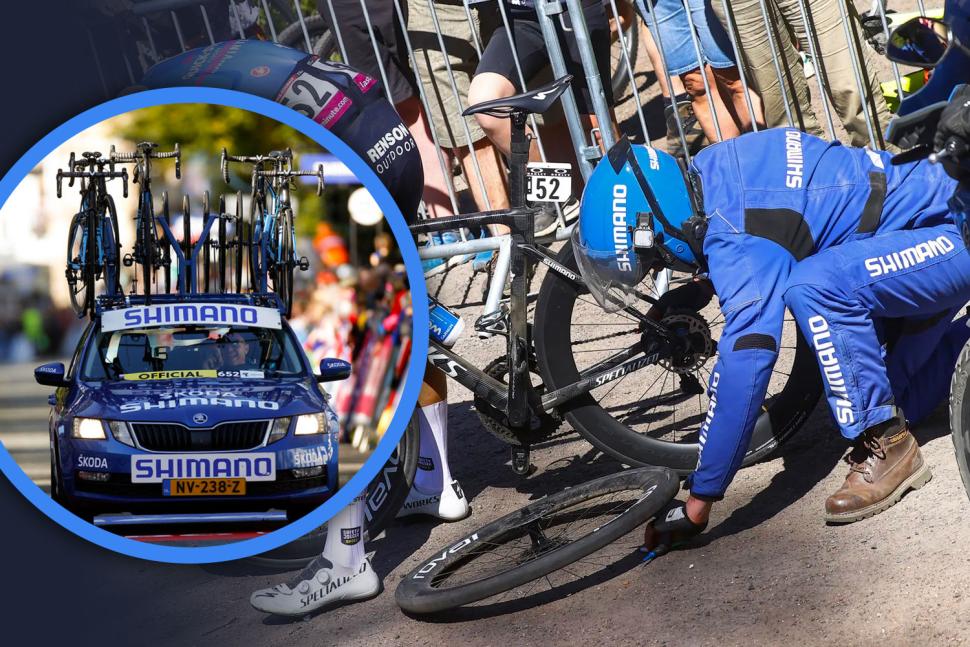
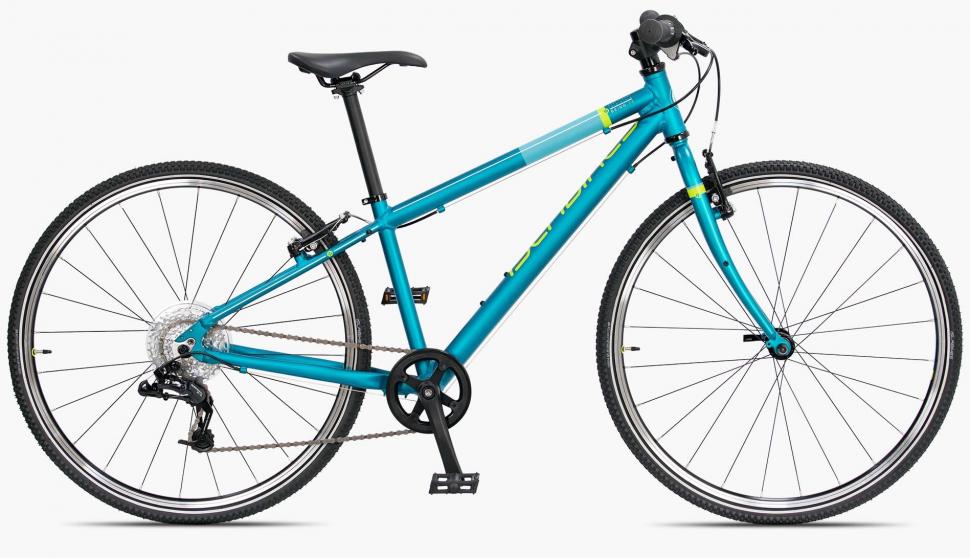
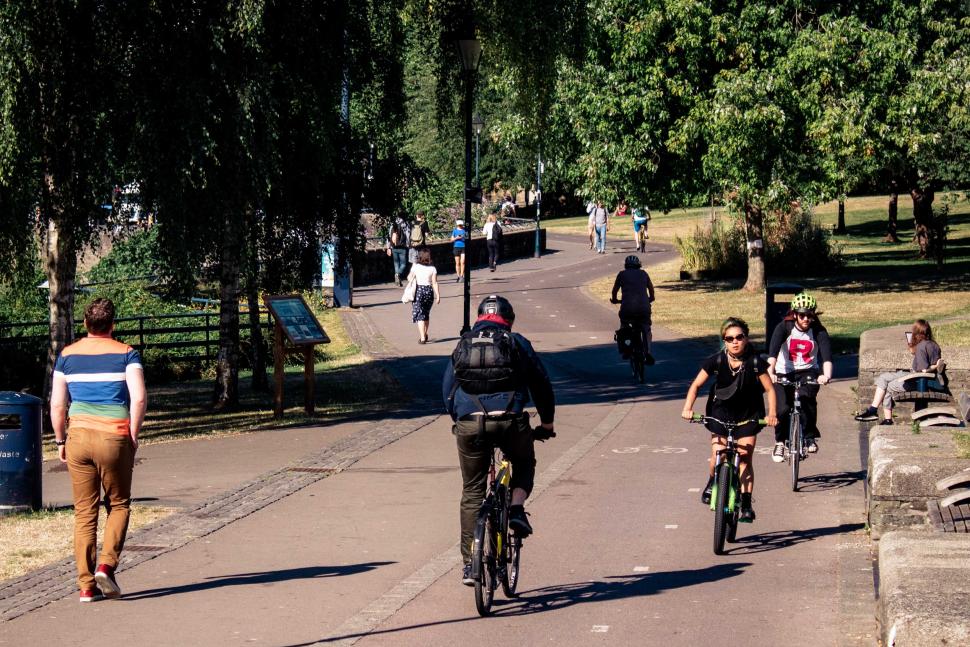
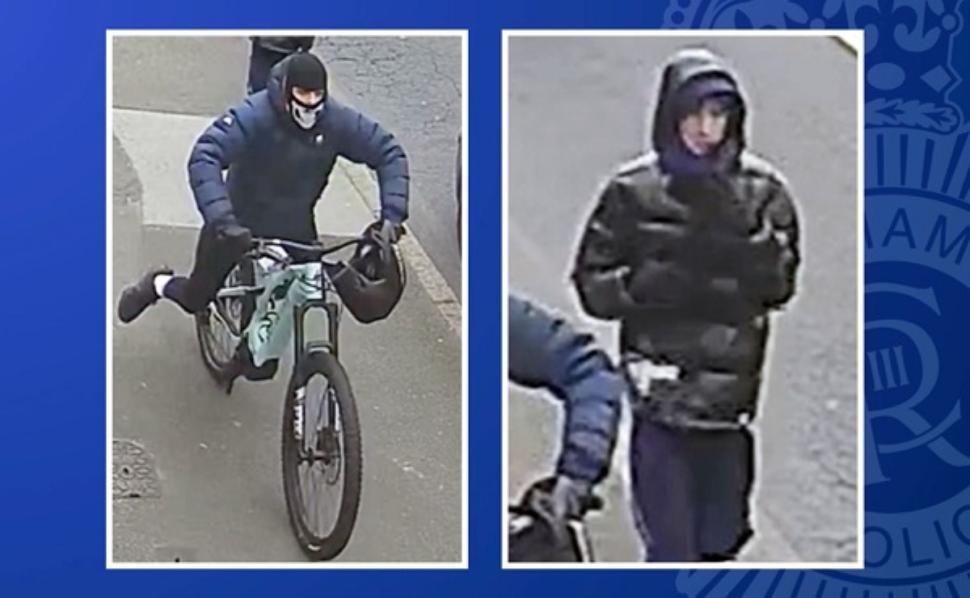
Add new comment
44 comments
Exactly. Most confusing.
Yep - and the markings that the drivers get to indicate they need to give way don't look like ones they would encounter most other places (they almost look like a crossing in their own right).
And just for the fun of it, there's an extraneous bollard whacked in the middle of the cycle track for no good reason.
The whole thing's a bit of a mess really.
A cunningly disguised solid black one, no less
the give ways shoudn't be there - design mistake.
the bollard though, I suspect theres a bit of continuation of what was there before - to stop drivers using that link as a cut through, there may actually be a cycle symbol on the front face, agree its not visible from the rear though...
https://www.google.co.uk/maps/@51.5417137,-0.084552,3a,41.4y,288.39h,81.1t/data=!3m7!1e1!3m5!1sbNm5OHGeYACYBKcihtfq6w!2e0!6shttps:%2F%2Fstreetviewpixels-pa.googleapis.com%2Fv1%2Fthumbnail%3Fpanoid%3DbNm5OHGeYACYBKcihtfq6w%26cb_client%3Dmaps_sv.share%26w%3D900%26h%3D600%26yaw%3D288.39150579650607%26pitch%3D8.900361303774787%26thumbfov%3D90!7i16384!8i8192?coh=205410&entry=ttu
Trying to fix current UK infra is like trying to graft legs onto a veggieburger ... but (albeit it'd need legislation) the Dutch system of triangles painted on the road ("shark's teeth" - like a painted give way sign, but smaller and multiple) might be exactly the kind of "quick fix" we like in the UK? (In that it wouldn't be quick, or fix anything, but it would cost less than doing something properly).
You would not believe the amount of grief it takes to get stuff like that painted on UK roads, even when councils have a statutory duty to upkeep road markings.
If the interviewer of Girmay knew he came from a country that is well documented on having problems with poverty, why is asking a question about his upbringing so out of order. Most documentaries about someone have a part about the person's upbringing to give context and to tell the story about that persons life and how they got to where they are. If the interviewer had have asked the same question to a top english cyclist that had being brought up on an estate well known for it's poverty would anyone have batted an eyelid?
If the interviewer had done their research and discovered that the subject had grown up with a background of poverty, it might be reasonable to ask about it*. In this case, though, they just seem to have assumed, incorrectly, that it was the case, based on a massive over-generalisation. It would be more like asking a Welsh cyclist the question because there's a lot of poverty in Wales - it's just lazy.
[*Even then, the way the question was asked would be clumsy - implying that if you've been affected by poverty then your most likely motivation for anything is money.]
Aren't a lot of people assuming that the interviewer is assuming? I haven't seen the documentary so can't really comment on the delivery of the questions but from what road cc has published above, that's what they are - questions - to give the viewer context and an insight in to Girmay's upbringing. If he'd have asked him "so your from Eritrea, I guess you had a tough upbringing and you used cycling as a way of staying out of trouble, right" then I could get the beef. Fair point Girmay not wanting to discuss it as money shouldn't be a factor of anything but for people to try and tie in that the interviewer is being racist and discriminating against 'a whole continent' probably says more about them than the interviewer.
But the nature of the questions assumes that Girmay must've grown up in poverty. Even if you feel it's not racist, the interviewer is at best incredibly lazy and frankly disrespectful: if they are going to interview one of the most famous cyclists in the world one would have thought they might read one or two articles about him and find out about his background beforehand and use that information when planning their questioning.
It's not just a question - it's a question that attempts to provide its own answer. They could have just asked something more open-ended, like 'So, what inspired you to take up cycling?'. Instead they chose to focus solely on the possibility that it was a response to poverty. Why do that, if not because you're assuming (on the basis of nothing in particular) that that's the answer?
You know how it is - easier to pigeonhole a person. Black Africans are poor, white Africans are racists, Irish are a wee bit daft and the Scots have long pockets and short arms. Unfortunately how much of the world works and it's very sad to see.
Except on this occasion it's been taken out of context then amplified on Twitter then amplified some more on here.
Don't know if it's been mentioned elsewhere, but St Chris is taking part along with the BBC in a cycle to Paris to highlight sustainability and climate change:
https://www.bbc.co.uk/sport/cycling/videos/cek9dy0v982o
https://www.indy100.com/sport/former-olympic-champion-cycling-to-paris-for-climate-change-awareness
Pages